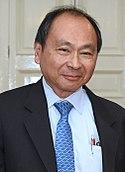Francis Fukuyama Quote
Samuel Huntington identified the Tudor character of American politics.1 According to Huntington, the Englishmen who settled North America in the seventeenth century brought with them many of the political practices of Tudor, or late medieval, England. On American soil these old institutions became entrenched and were eventually written into the American Constitution, a fragment of the old society frozen in time.2 Those Tudor characteristics included the Common Law as a source of authority, one higher than that of the executive, with a correspondingly strong role for courts in governance; a tradition of local self-rule; sovereignty divided among a host of bodies, rather than being concentrated in a centralized state; government with divided powers instead of divided functions, such that, for example, the judiciary exercised not just judicial but also quasi-legislative functions; and reliance on a popular militia rather than a standing army.
Samuel Huntington identified the Tudor character of American politics.1 According to Huntington, the Englishmen who settled North America in the seventeenth century brought with them many of the political practices of Tudor, or late medieval, England. On American soil these old institutions became entrenched and were eventually written into the American Constitution, a fragment of the old society frozen in time.2 Those Tudor characteristics included the Common Law as a source of authority, one higher than that of the executive, with a correspondingly strong role for courts in governance; a tradition of local self-rule; sovereignty divided among a host of bodies, rather than being concentrated in a centralized state; government with divided powers instead of divided functions, such that, for example, the judiciary exercised not just judicial but also quasi-legislative functions; and reliance on a popular militia rather than a standing army.
Related Quotes
About Francis Fukuyama
Fukuyama is best known for his book The End of History and the Last Man (1992), which argues that the worldwide spread of liberal democracies and free-market capitalism of the West and its lifestyle may signal the end point of humanity's sociocultural evolution and political struggle and become the final form of human government, an assessment met with numerous and substantial criticisms. In his subsequent book Trust: Social Virtues and Creation of Prosperity (1995), he modified his earlier position to acknowledge that culture cannot be cleanly separated from economics. Fukuyama is also associated with the rise of the neoconservative movement, from which he has since distanced himself.
Fukuyama has been a senior fellow at the Freeman Spogli Institute for International Studies since July 2010 and the Mosbacher Director of the Center on Democracy, Development and the Rule of Law at Stanford University. In August 2019, he was named director of the Ford Dorsey Master's in International Policy at Stanford.
Before that, he served as a professor and director of the International Development program at the School of Advanced International Studies of Johns Hopkins University. Previously, he was Omer L. and Nancy Hirst Professor of Public Policy at the School of Public Policy at George Mason University.
He is a council member of the International Forum for Democratic Studies founded by the National Endowment for Democracy and was a member of the Political Science Department of the RAND Corporation. He is also one of the 25 leading figures on the Information and Democracy Commission launched by Reporters Without Borders. In 2024 he received the Riggs Award for Lifetime Achievement in International and Comparative Public Administration.
